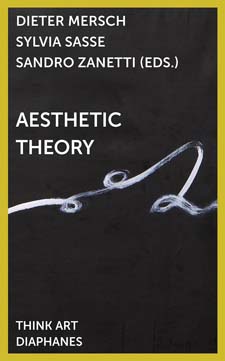Aesthetic Theory
Think Art
Dieter Mersch
 Posthumously having seen the light of day, Theodor Adornos take on what underpins the principles of art is much more than what the title suggests and it not only focusses on the core subject but expands on exploring the implications on sociology, art, politics and the realm of cognition.
Posthumously having seen the light of day, Theodor Adornos take on what underpins the principles of art is much more than what the title suggests and it not only focusses on the core subject but expands on exploring the implications on sociology, art, politics and the realm of cognition.
The concept that artists can channel their alchemy to provide commentary on the world we live in should be nothing new and is more often than not at least a desired side effect. Yes, beauty might be after all in the art of the beholder, but Adorno’s approach gave it another dimension in that he found veracity content and a specific message in the emissions of an artists.
Dieter Mersch’s Aesthetic Theory not only explores the aforementioned but includes a wide array of essays from a range of thinkers and luminaries, which aim at dissecting the delicate and often very subtle link between aesthetic event and theory.
The tome provides food for thought by shedding light on how artistic social commentary can have a tangible impact on the general population and thereby become a cataclysm for change. One feels triggered to look below the surface, read between the lines and inspires one to try a bit harder to comprehend what the meaning of a piece of art could be attempting to communicate.
It would be difficult to make a compelling case for Adorno’s thought not having become an integral part of modern aesthetics and thereby of popular culture at large. As such, the book is indispensable as a reference when it comes to analysing human experience and what makes us tick, by not reducing the matter to sociological factors but as Adorno put it ever so eloquently – “the sedimented history of human history”, which he perceived to be the origin of all artistic endeavours.